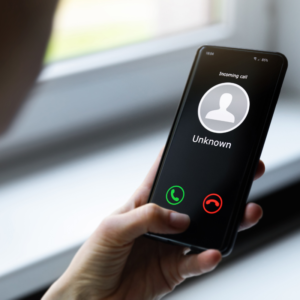In 2021, more than half of Americans received a scam call or a text message, making mobile phones the newest platform for fraud. US residents lost a total of $30 billion last year alone, which increased by $10 billion from the previous year. (Comparitech January 2022)
With the increase of this specific use of communication, it is important to stay educated and informed on the latest mobile phone scams and learn how to protect yourself and your personal information. Here are some of the latest scams:
Live-Calling– These callers are looking for users to give up their personal information. Included in this type of scam is:
-
- Imposter- Impersonating a government agency such as the Social Security Administration or the IRS
- Debt relief and credit repair- offering to lower your interest rate or fix your credit
- Charity- requesting donations for disaster relief efforts
- Business and Investment opportunities- offering to help start your own business
- “Free” trials that later bill monthly
- Prize and lottery- caller informs you of the cost of taxes or registration fees on the prize won, however, once the fees are paid no prize is awarded
- Extended car warranties- urge you to buy overpriced or worthless service contracts
- Travel and Timeshare- free or low-cost vacations that include various hidden costs
 To prevent this type of scam, hang up, block these calls and do not trust the caller ID. Scammers can make any name or number show up on a caller ID.
To prevent this type of scam, hang up, block these calls and do not trust the caller ID. Scammers can make any name or number show up on a caller ID.
Smishing– The act of receiving a text message, supposedly from a trusted source, that aims to solicit personal information. The goal is to get the user to click a link where they will ask for personal information or attempt to install malicious coding onto your mobile device. Fraudsters can then use credentials to obtain one-time authorization codes sent via SMS for entrance into the user’s various accounts.
Examples of Smishing include:
-
- Urgent credit card messages
- Locked bank account alert
- A clickable link to claim your prize/surveys
- Unusual account activity advisory
To prevent Smishing, do not click on any links or respond to texts with an unfamiliar sender. Also, do not take the action required by the sender; choose to contact the company using a method you trust, such as a telephone call instead, to verify the text was legit and not a scam.
Automated Threats– Phone numbers are particularly valuable to hackers because services often use SMS for multi-factor authentication. If a hacker can take control of a victim’s number through manipulated automation, they may be able to reroute login verification codes to themselves and complete fraudulent transactions.
Some financial institutions are now employing zero-factor authentication (0FA) to recognize users seamlessly, using sensors and mobile technologies and app shielding which shuts down banking apps if malicious threats are detected.
Please remember that Parke Bank will not ask for any personal information via email or text message. If you suspect you have received a fraudulent email or text, please contact us at 856-256-2500.
